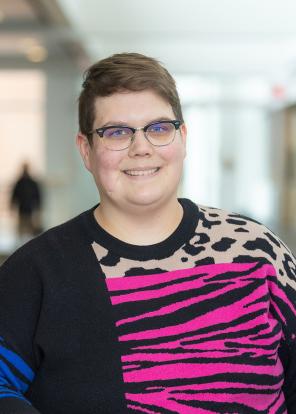
Expanding mental health support: Meet Carlson School’s new graduate student counselor
Monday, January 29, 2024
The Carlson School prioritizes mental health support for students by meeting them–literally–where they are. Since 2018, there has been an embedded counselor for undergraduate students. Beginning this past fall, Mitch Paradise, MSW, LICSW, joined the Carlson School to provide the same services for graduate students. Both roles are supported by the University’s Student Counseling Services.
Paradise, whose social work career has focused on transitional-age youth in the 18-24 range, most recently came to the Carlson School from the Minneapolis College of Art and Design, where they were providing mental health counseling for undergraduate and graduate students.
We recently spoke to Paradise about how their role has already made a difference and the importance of mental health resources.
Q: What drew you to working with the Carlson School?
I was drawn to the business school specifically because in recent years there’s been an increased discussion around work, work identity, mental health, and self-care and how all of these pieces fit together. It excited me to think about how many of the Carlson School students are either current or future industry leaders, and it’s very radical to be able to provide tips and support to model self-care for folks, and have that radiate throughout the business world. Also, post-COVID, we’ve seen increased rates of anxiety, depression, and ADHD. How people experience the world is diverse and while there is always more work to be done, we have largely seen more access to information and language, as well as spaces to talk openly about mental health and mental health needs. We see that students are advocating for themselves, and it’s exciting for me to be part of meeting that need.
Q: Why do you think it's important for a position like yours to be embedded within the school?
Anecdotally, I have worked with more Carlson School graduate students in my short time here than the amount of Carlson School graduate students (UMN) Student Counseling Services saw all of last academic year. That’s not because there wasn’t a need. But, I think due to barriers–whether it’s physical or time barriers–having embedded counselors as a position is pretty transformational. Just the accessibility of being able to stop by someone’s office. Even taking the 5-10 minute walk across the bridge, some folks might not have the time to spare, but that doesn’t mean they wouldn’t benefit from services.
Q: What are some of the biggest mental health challenges graduate business students are more likely to face?
Graduate programs in the business school are really academically rigorous. They demand a lot from students. There’s also that intrinsic personal value put on these programs, because people are leveraging their time to get ahead in their careers, be entrepreneurs, or continue growing in the business sphere. So I’m definitely seeing a lot of anxiety and stress, and they’re different, but very much related, and finding ways to manage that. I also think—it’s not a diagnosis clinically—there’s a lot of perfectionism, because the stakes are so high and people value their time and education. I’m challenging some of those cognitive distortions that come up for folks, like all-or-nothing thinking. I’m working with students in particular who are often pretty savvy, and I find myself reflecting a lot with, ‘You are a capable, smart person, and if this was easy, you would figure it out, you would do it. But being a human is not easy, so where can we be kind to ourselves.’
Q: What would you say to a student who has not worked with a counselor before or who may not know what to expect from a counseling session, but who is considering reaching out for support?
I would say two things. First, you don’t have to come when you’re in crisis. There’s a lot of value to accessing services outside of crisis. To look at things through a different perspective versus if we’re in survival mode, stressed beyond belief, deeply anxious, or in the throes of depression. Knowing that those services are available to you and you don’t have to have something quote-unquote wrong, can be really beneficial.
Second, I very much view a counseling relationship as a collaboration. I tell every client I have within the first 10 minutes of meeting with them that I have an educational background and experience in the mental health field and they know what’s going on with them. They know what works, what maybe doesn’t work, and from my perspective, it’s how can we leverage these facts in ways that are affirming and productive, and ultimately gets at their goals.
Students interested in learning more or scheduling a session can find Mitch Paradise in the MBA and MS Programs suite on the first floor of the Carlson School Building, where they offer individual counseling at no additional cost to students. Sessions are available both in-person and via telehealth. If you have any questions about getting started or accessing mental health resources, email Mitch at parad188@umn.edu.
